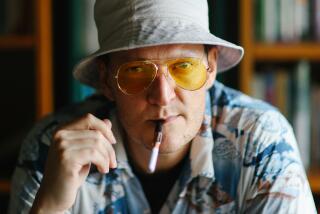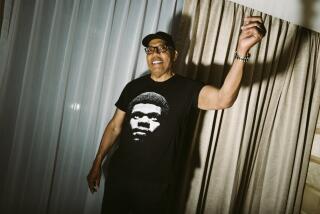Fred Dryer Scores With ‘Hunter’
Take the helmet off most great football players, put them on TV and you get loud-mouth sports commentators or mediocre hulking actors.
But take the helmet off former Los Angeles Rams defensive end Fred Dryer and you get “Hunter”--a key cog in the NBC ratings juggernaut the past several seasons, and, if you listen to some of the people who have worked with him, the embryonic stirrings of the next John Wayne.
“Fred Dryer is the ultimate American hero,” said Roy Huggins, former executive producer of “Hunter.” “He’s an icon. He walks across the screen and you say, ‘Yeah, there goes another one.’ Another Gary Cooper, John Wayne, Clint Eastwood. I think Fred is an actor who just happened to play football.”
Still an imposingly tall, lean and graceful figure seven years after hanging up his cleats, Dryer, 42, shrugs off such comparisons with the well-rehearsed rebuttal: “There is no one who can replace Clint Eastwood. He’s one of my heroes along with John Wayne and Steve McQueen. I came up on those guys. If I could have one-tenth the success of Eastwood, I’d be happy.”
But Dryer is not bashful about insisting that unlike most washed-up athletes who cash in their shoulder pads and broken bones for a bumpy ride in the Hollywood limelight, he is an enormously confident, hugely ambitious actor who is dead serious about his craft. Nor is he shy about accepting credit for helping to transform “Hunter” from a pathetic flop on the verge of extinction into a solid ratings hit.
“People watch television to see people,” Dryer said. “They want to see James Garner or Don Johnson or J. R. Ewing. NBC stuck with the show after that first season because they liked me. And once they put it in the right time slot, I became known to the viewers and my popularity and the popularity of the show just shot up.”
In it’s first season, “Hunter” was pulverized by television critics and manhandled by “Dallas” the way Dryer used to terrorize and crush opposing quarterbacks during his 13-year career with the New York Giants and Rams.
Critics called the latest extravaganza from action-show kingpin Stephen J. Cannell “the season’s most alarming and despicable cop show,” “littered with bad acting,” “criminally bad.” And of Dryer’s foray into prime time one critic scoffed: “He moved from the NFL’s defensive line to the very front line of TV offensiveness.”
But as bad as the reviews were, the ratings were even worse. “Hunter” floundered in the nether regions of the ratings chart--somewhere around the 65th-watched prime-time show in 1984--a fate from which few, especially a car-chase-riddled “poor man’s Dirty Harry” survive.
NBC cut “Hunter” after three months of bad performances and reinserted it into the lineup against weaker competition on Saturdays a few months later. The show’s ratings soon began to inch upwards, encouraging the network to renew it for another season.
Cannell hired Huggins, his mentor from “The Rockford Files,” to head up the series in its second year, and Huggins immediately took Hunter, the renegade, no-nonsense homicide detective, out of the filthy alleyways of downtown Los Angeles, away from the thugs, winos and psycho killers that had peopled every show, and moved him to Bel-Air and Malibu.
He also threw out most of the car chases and explosions. “I put the poor stunt men in shock,” Huggins said. “There is a movie audience for gore and explosions and severed limbs, but that show would be (ranked) No. 80 on television. The television audience is a huge mass, and they demand good stories, good melodramas.”
While nobody will ever mistake the drama on “Hunter” for Shakespeare or even “Cagney & Lacey” (every “Hunter” begins with a dead body), Huggins filled the show with enough plot and intrigue to make it a hit. Following NBC’s smash sitcoms “The Golden Girls” and “Amen” didn’t hurt either. After a strong fourth season as the highest-rated action crime show on television, reruns of “Hunter” consistently have landed in the Top 10 this summer. The show has also been an enormous success in many foreign countries, recently becoming the most-watched show in China, according to its production company.
“As soon as the story improved, the show took off,” said Huggins, who recently left the series after three years at the helm. “People just love Fred Dryer.”
“Hunter is a man of action, who also has great compassion for the people he has to deal with,” said George Geiger, the show’s new executive producer, who this season plans to continue the good-guy/bad-guy plot lines while opening up the personal lives of Hunter and his tough, sexy partner played by Stepfanie Kramer.
“He’s a champion. He’ll come to your rescue,” Geiger said. “That’s the appeal of the hero. In a confusing world filled with disappointments and problems, the good hero gives us someone to believe in. Someone who will fight and win our fights for us.”
In a way it is ironic that a football star--a species so often revered as heroes in our culture--could become an even bigger hero after his playing days.
Dryer recently served as the grand marshal of the Pro Football Hall of Fame parade in Canton, Ohio, and he said he was surprised by the mobs of people who were screaming for Hunter. Most of the adoring children, Dryer said, had no idea that he had ever played football.
Dryer believes that he has succeeded in Hollywood where other athletes have failed precisely because he killed off Fred Dryer the football player and left him in his locker with his shoulder pads and face mask when he retired.
While some ex-footballers including Merlin Olsen (“Little House on the Prairie,” “Aaron’s Way”); Ed Marinaro (“Hill St. Blues”), and Alex Karras (“Webster”) have enjoyed modest success on television, the majority of athlete-actors bomb.
“Bringing this dynamic athlete into the insurance or real estate business can work for you,” Dryer said, passing another summer day in his West Los Angeles condominium with his 4-year-old daughter. “But acting is different. You have to kill that football guy off because he can’t help you. The mistake a lot of athletes have made is they don’t get rid of that guy. They want to bring that successful football player to acting, and it screws up the technique. It blocks them from looking at the work clearly and becoming another character. They march that ego, their fame, their name right in there and they expect to be given work because they are famous football players.”
About halfway through his football career, Dryer began to “burn out” from the monotony of training camps and practices. Having always been fascinated by films and how they worked and having always found great satisfaction in the fact that he had always been one of the best in the exclusive world of professional football, Dryer thought it perfect to embark on a serious course of study--including classes with acting coach Nina Foch--that would eventually land him a prized spot in the exclusive world of big-time acting.
When he retired from football in 1981, Dryer said that producers and casting directors invited him in simply because he was Fred Dryer, ex-football star, and they were willing to cast him in “typical ex-jock” bit parts.
But Dryer held out, waiting for the kind of parts that would help groom him to be a star. Cannell gave him a big break by hiring him as one of the bad guys in the short-lived series “The Rousters,” and when “Hunter” rolled off his action-adventure assembly line, Cannell thought Dryer would be perfect.
As unlikely as it may seem, Dryer was also one of the three finalists--along with Ted Danson and William Devane--up for the part of Sam on “Cheers.”
“I could have played the hell out of Sam,” Dryer insisted in response to the assertion that while it is easy to see his 6-foot-6 frame in the role of a tough, action hero--the kind he played in the rather forgettable movie “Death Before Dishonor”--he does not easily come across as a romantic or comic leading man.
“Bogart was romantic as well a tough guy. I do see myself continuing in action film roles, but I want to do comedies and romantic stuff too. I want to do ‘Out of Africas.’ I’m never going to be Hamlet. But do you think Lawrence Olivier could do what I do? Do you think he could kick down a door?”
Kramer and the producers of “Hunter” concur that Dryer can be a funny actor as well as a charismatic tough guy. But while fans and skeptics alike will have to wait to see whether Dryer is versatile enough to follow in the footsteps of such TV stars as Tom Selleck and Bruce Willis, who play action and romantic leads on film, they will only have to wait until late October to see Dryer kicking down new doors on Saturday nights.
As long as the ratings remain high, Dryer said he intends to do three more seasons of “Hunter” before devoting his full time to the pursuit of the perfect cinematic melding of Eastwood and Bogart and Redford.
More to Read
Go beyond the scoreboard
Get the latest on L.A.'s teams in the daily Sports Report newsletter.
You may occasionally receive promotional content from the Los Angeles Times.










